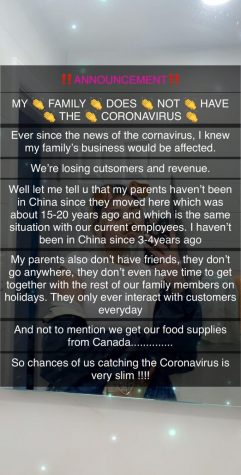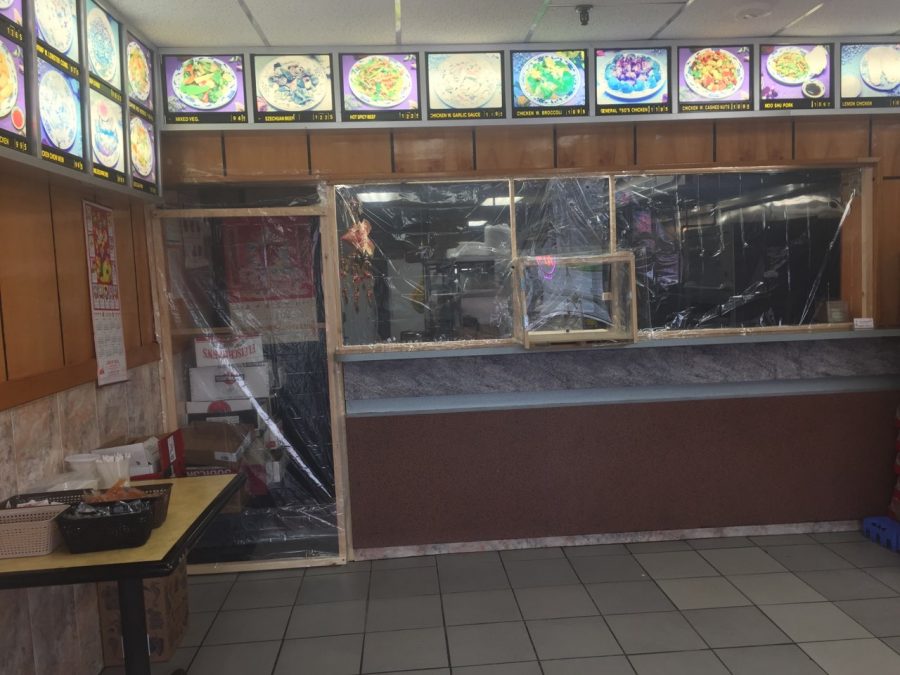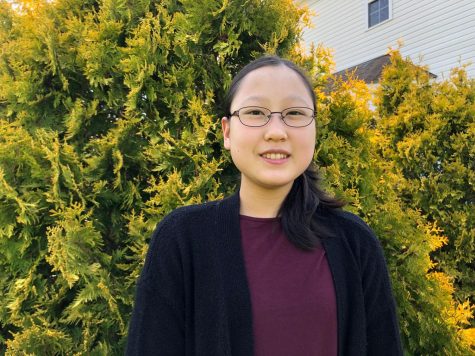Discrimination Shows its Ugly Face in Times of Crisis
Joy Wo Kitchen in Shoreham Plaza will be reopening for take-out after being temporarily closed due to the quarantine.
On March 20th, 2020, New York Governor Andrew Cuomo issued an executive order ordering all New Yorkers to refrain from leaving their homes and closing all businesses except those deemed essential. Restaurants were one such business, although they could remain open for take-out and delivery. Six weeks earlier, Joy Wo Kitchen, a Chinese restaurant located in Shoreham Plaza, had noticed a significant decrease in customers, and fear of the mounting pandemic was to blame.
Sophia Han is a senior at Shoreham-Wading River High School and her parents are the owners of Joy Wo Kitchen. Her family also happens to be Chinese. During the first week of February, SWR students were blissfully unaware of the truly catastrophic effects that COVID-19 would bring in March, yet Joy Wo Kitchen was losing business. According to restaurant manager, Lilian Zhang, “business dropped about 40-50%.” Noticing this loss, Han took to social media. On February 12th, she posted an announcement on her Snapchat story stating, “MY 👏 FAMILY 👏 DOES 👏 NOT 👏 HAVE 👏 THE 👏 CORONAVIRUS 👏.” Han continued, describing her family’s history (or lack thereof) of travelling to China as well as informing people the food served at their restaurant comes from Canada. Han later explained that she wanted “to relieve some concerns that some people might have,” saying, “I do know that some people actually think that you can get Coronavirus by eating Chinese food, which is obviously false but whatever.” According to the World Health Organization and the CDC, the Coronavirus is mainly spread from person-to-person contact through small respiratory droplets. The Food and Drug Administration (FDA) has also stated “[c]urrently there is no evidence of food or food packaging being associated with transmission of COVID-19.” When asked whether her family’s ethnicity resulted in a larger impact on their business, Han responded, “I definitely think my parents’ business was a little more affected in the beginning of the pandemic. Not many people came in compared to other businesses at the Shoreham Plaza. I’d like to believe that it’s not because of our ethnicity, but [racial bias] can’t be helped.”

Due to the outbreak starting in a region of China, Asian Americans and Asian residents in the U.S. have experienced a rise in hate crimes and discrimination. Stop AAPI Hate, a reporting center started on March 19th, has received over 750 reports of “verbal harassment, shunning, and physical assault” due to the Coronavirus as of March 27th. Unsurprisingly, many Asian Americans were racially profiled, with 61% of victims being non-Chinese. Mean-spirited comments on China’s culturally different menu items have also resurfaced and contributed to the fear regarding the safety of Chinese take-out food. Han comments, “I especially keep finding rumors that you can get Coronavirus by eating Chinese food circulating on social media which blows my mind on how ignorant people can be. Chinese food, first of all, is Americanized Chinese food. Second of all, this type of food is nowhere near or close to the type of Oriental foods you find on the streets of China. Therefore, the types of food that we put into our dishes isn’t something that [people] are completely unaware of.”
Recently, President Trump has been criticized for his insistence on calling the Coronavirus, the “Chinese virus”. In a Washington Post article, psychology professor Charissa Cheah is quoted saying, “[Trump is] essentially throwing his American citizens or residents of Chinese and Asian descent ‘under the bus’ by ignoring the consequences of the language he uses.” She goes on to say, “[h]e’s fueling these anti-Chinese sentiments among Americans… not caring that the people who will truly suffer the most are Chinese and other Asian Americans, his citizens whom he’s supposed to protect.” Han agrees, saying “for him to carelessly throw that term out there obviously incites anger and controversy all over the media rather than soothing or calming down the public.” On March 2, the World Health Organization posted a tweet saying “DON’T – attach locations or ethnicity to the disease, this is not a ‘Wuhan Virus’, ‘Chinese Virus’ or ‘Asian Virus’. The official name for the disease was deliberately chosen to avoid stigmatization.” In another tweet, the WHO said, “[s]tigma can drive people away from seeking help by getting screened, tested and quarantined” and their Director-General, Dr. Tedros Adhanom Ghebreyesus said “Stigma is the most dangerous enemy.”







